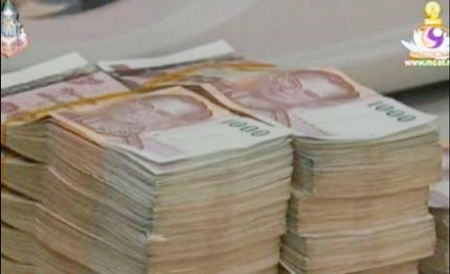BANGKOK, Nov 27 – The Bank of Thailand (BoT) on Wednesday slashed its policy interest rate by 0.25 per cent, to 2.25 per cent, saying growth in the third quarter of this year was weaker than expected from both private and public spending.
The central bank’s Monetary Policy Committee (MPC) voted 6 to 1 to reduce the policy rate from 2.50 to 2.25 per cent, with immediate effect. One member deemed current monetary policy stance to be sufficiently accommodative,

MPC Secretary Paiboon Kittisrikangwan announced the decision after the committee meeting.
“The growth of the Thai economy in the third quarter of 2013 was weaker than expected in both private and public spending. Recovery in exports has not gained traction,” the committee said in its statement.
The MPC also warned about “higher downside risks to growth stemming from delay in government investment and fragile private confidence, which could be compounded by the ongoing political situation.”
The decision came in the wake of escalating protests to topple the Yingluck Shinawatra government which spread outside the capital. Protesters rallied peacefully outside many provincial halls mainly in the opposition Democrat Party’s stronghold in the southern region. The Pheu Thai-led government also faces a no-confidence debate in the lower house.
“In addition, exports might not benefit fully from prospective global economic recovery. Inflationary pressure remains subdued, while private credits decelerated in line with the economy,” it said.
The committee judges that the Thai economy is expanding at a slower pace than previously assessed, with greater downside risks compared with the last meeting. Given the benign inflation outlook and moderating household credit growth, there is room for the monetary policy to mitigate downside risks to the economy.
The global economy continued to recover, led by expansion in the major economies, particularly that of the United States. High uncertainty in the outlook for American monetary and fiscal policies continues to weigh on global financial market stability.
The Chinese economy expanded well across all sectors, while the regional economies continued to grow gradually.
Exports of the North Asian economies recovered in tandem with the major and Chinese economies, and at a more robust pace than those of Thailand’s ASEAN peers.




